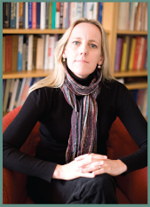EDITOR’S NOTE
 In the words of Salman Rushdie, “What is freedom of expression? Without the freedom to offend, it ceases to exist.”
In the words of Salman Rushdie, “What is freedom of expression? Without the freedom to offend, it ceases to exist.”
This is from a man who knows a thing or two about the power of words (and whose recently published memoir about how much trouble his words caused gets thorough coverage in this issue’s book review section). Of course, Rushdie’s point isn’t that we must try to offend every time we choose to share our ideas and opinions, just that if our words make others uncomfortable and we aren’t penalized for it, the right to free speech is bolstered.
The fact that speech deemed offensive (by someone, somewhere) is being punished on college and university campuses in the United States is what concerns the subject of this issue’s interview conducted by Marty Klein. Greg Lukianoff is the president of FIRE—the Foundation for Individual Rights in Education—and some of the stories he tells will shock you. Take, for example, the professor accused of harassment for using a racial slur even when his intention was to inform students about racial insensitivity. If students can’t learn to differentiate intent and aren’t expected to wrestle with ideas, then surely the university is letting them down. And FIRE is doing its part to see that teachable moments can indeed be allowed to happen.
Rep. Don Young (R-Alaska) learned the power of such a moment recently when, in a radio interview, he referred to the Latino immigrants who picked tomatoes on his father’s farm in California as “wetbacks.” Young pleaded ignorance as to the term’s negative connotation after he was publically called out for it. Whether Young truly didn’t know it was a racial slur or not, he knows now. When it comes to advocating for free expression and effective teaching, including encouraging students to think critically, humanists could be forgiven a certain amount of wariness, what with the attempts by religious conservatives to cast the teaching of creationism in public high schools as a desire to foster critical thinking by exploring multiple viewpoints and encouraging dissent. But that’s a ruse, and we should be grateful to the individuals dedicated to exposing it as such.
Take Zack Kopplin, who as a Baton Rouge high school student in 2010 took on the challenge to repeal Louisiana’s Science Education Act as a class project. The law, enacted in 2008, permits science teachers in public schools to use supplemental materials that question established scientific consensus on evolution and global warming. An overwhelming number of scientists and educators see this supplemental material for what it really is, religious or otherwise unscientific ideas. Appearing on Hardball with Chris Matthews in June of last year, Kopplin summed up the ludicrous claims of the bill’s supporters, stating, “You don’t need a law to teach critical thinking. That’s what science is. You need a law to teach creationism.”
Defenders of free speech and the establishment clause are vital to ensure that laws aren’t passed in violation of the First Amendment. Robert Heinlein (who wrote the cult classic, Stranger in a Strange Land) expressed the need rather ominously in his 1973 novel, Time Enough for Love, when the main character states, “It is a truism that almost any sect, cult, or religion will legislate its creed into law if it acquires the political power to do so, and will follow it by suppressing opposition, subverting all education to seize early the minds of the young, and by killing, locking up, or driving underground all heretics.”
Considering the recent arrest of atheist bloggers in Bangladesh charged with insulting Islam—they face up to ten years in prison for blasphemy but angry Muslims are waging large protests and calling for their heads—we should neither be offended by Heinlein’s words, nor should we write them off as the dystopian echoes of a bygone science fiction.![]()
—Jennifer Bardi
